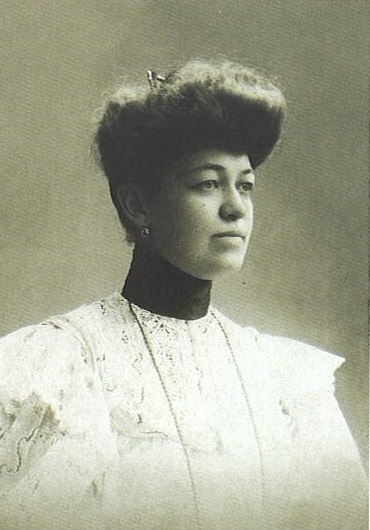Margarita Ivanovna Rudomino (1900-1990) was a legendary librarian and bibliographer, the founder of the Library for Foreign Literature and its director for more than fifty years. The Library foundation and its activities were taking place during one of the most difficult periods of Russian history, and Margarita Ivanovna was forced to face many obstacles along the way.
Childhood
Białystok, Grodno, Saratov, Kiev

Margarita Ivanovna Rudomino was born in the city of Białystok, Grodno Governorate, on July, the 3rd (June, the 20th according to the old style), 1900. Białystok was first mentioned in written sources in 1437, this city was part of the Grand Duchy of Lithuania, then of The Kingdom of Poland. After a short period of being a part of Prussia, under the terms of the Treaties of Tilsit in 1807 Białostok became the part of the Russian Empire, and now it is the administrative center of the Białystok Voivodeship in Poland.
Białystok
I did not know this city at all since it was only the place of my birth: my father Ivan Mikhailovich Rudomino temporarily worked there as a district agronomist. We lived in a red-brick service house: my father's office was on the ground floor, on the first floor there was a four-room apartment, in which my parents settled after the wedding in 1898 and my father's appointment as an agronomist in the Białystok district. My mother received all the furniture and household utensils from my grandmother as a dowry. *
* In 1897-1901 Ivan Mikhailovich Rudomino (1860-1916) in 1897-1901 served in Bialystok as the head of the Białystok state-owned No. 2 wine warehouse. On March, the 20th, 1901 he was appointed to the same position in Petrovsk in the Saratov Governotate.

"My grandmother on my mother's side - Olga Fyodorovna Knote - was my godmother. I became her first granddaughter. My godfather was the General of the Infantry Alphonse Ivanovich Bush. He served and lived with his family in Białystok, he was a friend of my parents and always took care of me, gave me toys and books. I don't remember Białystok. In 1901 we left it."
In 1901 the family moved to the Saratov Governonate where Margarita Ivanovna's father got a new job. But later she came to the Grodno Governonate or rather to the city of Grodno with her mum many times, her grandmother and grandfather lived there. The days spent in this city, throughout her whole life, remained one of the most cherished memories of her childhood.
Returning home from Grodno in 1913, Margarita Ivanovna did not suspect that the next time she would visit this city only in 1978. Of course, by that time it had changed beyond recognition. And everyone she knew had long been dead.
Returning home from Grodno in 1913, Margarita Ivanovna did not suspect that the next time she would visit this city only in 1978. Of course, by that time it had changed beyond recognition. And everyone she knew had long been dead.
Grodno
"The last time we visited Grodno was in the summer of 1913, a year before the First World War. At that time my grandmother's house was full of life of a large family and was a place of happy meetings of relatives… My grandmother's house was located in the center of the city. In the big courtyard behind the house, we children were playing cops and robbers. On the main street there was my grandfather's shop (my grandfather was a merchant of the second guild) and the Mariinsky Gymnasium, where my mother had studied. The Neman River was flowing through the city. On its high bank there was an old castle and a church. Because of the ferocious nature of the Neman we children were not allowed to go to the river alone."
«There was nobody to look for. But I found my grandmother's house. It looked the same as I remembered: one-story, with four windows along the facade. Being in Moscow, I took out photographs of my grandmother's house of the late 19th century from a family album and took them with me to make sure.
There was a sign on the facade of the building - "Prosthetic Department of Grodno Dental Institute". This sign has separated the years. Entering, I was worried, my heart began to beat, my legs trembled a little. Walking around the rooms, I imagined the setting of grandmother's living room, dining room, and kitchen instead of the dental chairs now standing there. I was completely at the mercy of sad half a century old memories and the fact that I would never see any of my relatives. A lump came up to my throat».
There was a sign on the facade of the building - "Prosthetic Department of Grodno Dental Institute". This sign has separated the years. Entering, I was worried, my heart began to beat, my legs trembled a little. Walking around the rooms, I imagined the setting of grandmother's living room, dining room, and kitchen instead of the dental chairs now standing there. I was completely at the mercy of sad half a century old memories and the fact that I would never see any of my relatives. A lump came up to my throat».

Since 1901, the Rudomino family had been living in the Saratov province, and in 1905 they moved to Saratov. Eleonora Yakovlevna Knote, Margarita Ivanovna's mother, was a teacher, she worked as a teacher of German at the First Saratov Women's Gymnasium and was one of the theorists and promoters of the so-called natural method of teaching foreign languages, which combined the visual, auditory and speech aspects of language learning. She organized the Society of Teachers of Foreign Languages in Saratov, became its chairman, and published books on pedagogy.
Eleonora Yakovlevna died on April, the 10th, 1915, when her daughter was not yet fifteen years old.
Eleonora Yakovlevna died on April, the 10th, 1915, when her daughter was not yet fifteen years old.
Saratov. Parents
«Mother was strict with me, maybe even too strict, and I was very afraid of her. From childhood, she taught me to work: at the age of 5 I laid the table, dusted the furniture in the house, carried out her orders. She taught me music, I began to study foreign languages with her. But, oddly enough, I wasn't keen on learning from her. She was probably too demanding of me. When I studied at her gymnasium (first four years), she never distinguished me from other students, but, on the contrary, was stricter and more exacting. I remember well how she would call me to the blackboard, knowing that I had not prepared a lesson the day before, and gave me unsatisfactory marks. Especially mercilessly she gave me unsatisfactory marks when I forgot my notebook at home».
Father, Ivan Mikhailovich Rudomino, left the service in the Saratov excise department in 1906 and became a private entrepreneur, but things did not go well for him, and he had to return to the service, that time to the Peasant Land Bank, where he was envolved in the liquidation of bankrupt landowners ... On the eve of the war, he served as a government agronomist in the Lublin province.
Ivan Mikhailovich didn't outlive his wife much. He died of a heart attack on April, the 1st, 1916 in Tiflis, where he served in the apparatus of the Ministry of Food Commissioner for the preparation of hay for the army. Margarita Ivanovna admitted that that news shocked her, and then she remembered that year, when at the age of fifteen she had become a complete orphan, as one of the most difficult in her life.
Ivan Mikhailovich didn't outlive his wife much. He died of a heart attack on April, the 1st, 1916 in Tiflis, where he served in the apparatus of the Ministry of Food Commissioner for the preparation of hay for the army. Margarita Ivanovna admitted that that news shocked her, and then she remembered that year, when at the age of fifteen she had become a complete orphan, as one of the most difficult in her life.

«On the day of my father's death, April the 1st, 1916, it was the Friday before Easter, I was going home after classes at the gymnasium. It was a sunny spring day. The sky was blue, snow was melting, streams of water were flowing. Suddenly I began to cry: my future as a "cook" seemed the only possible career for me - I saw no other way out at that moment. At home, my aunt began to console me, offered to take off the crepe from my spring hat and replace it with a light grey ribbon (10 days later, the mourning after the death of my mother ended). And in the morning of April, the 3rd, a postman brought a letter from dad's brother Christofor Mikhailovich, whom dad had summoned before his death to Tiflis, where it was reported about dad's death: "... the poor man died in my arms ..."».
The family meeting decided that Margarita Ivanovna would live with her aunt, mother's sister Yekaterina Yakovlevna Kester, who organized the Higher Courses of Foreign Languages in Saratov. But in the summer of 1916 she was invited to Kiev by another mother's sister - Olga Yakovlevna. That trip had a great influence on the whole life of Margarita Ivanovna. It was in Kiev that she first saw her future husband Vasiliy Nikolaevich Moskalenko, who was the brother of Olga Yakovlevna's husband and at that time taught Russian and Russian literature at Alexander's gymnasium for boys. Then she met the nephew of Vasiliy Nikolayevich, a nine-year-old boy Seryozha Korolev, a future scientist, constructor and academician, they became friends for the whole life.
Kiev, 1916
«I saw Vasiliy Nikolaevich Moskalenko on the first day of my arrival in Kiev. Of course, I immediately fell in love. He was very handsome. Vasiliy Nikolaevich, being a 27-year-old bachelor, did not pay attention to me, a 16-year-old girl. However, when I returned to Saratov, I boasted to my friends - I told them that we were dating, that I got engaged, and the mother blessed him, and that he was about to come, or I would go to him. But the revolution and the years of the civil war separated me from Kiev for a long time. And the next meeting took place only in 1921».

Margarita Rudomino, 1916
Left without parents, Margarita Ivanovna painfully experienced her dependence on her aunt, Yekaterina Yakovlevna Kester, with whom she lived, trying hard to prove her usefulness. Despite studying at the gymnasium, she helped her aunt at the Higher Courses of Foreign Languages and constantly helped abound the house.
In 1918, after graduating from gymnasium, Margarita Ivanovna began to teach handicrafts, and then mathematics at the Third Soviet School while continuing to work as a librarian at the Higher Courses of Foreign Languages. Taking this position, in which she worked for about two years, Margarita Ivanovna entered the courses of librarians at the Saratov University. Thus, the foundations of her future professional activity were laid.
The last years in Saratov for Margarita Ivanovna came at a difficult time of the Civil War, with the devastation, hunger and disease it brought.
In 1918, after graduating from gymnasium, Margarita Ivanovna began to teach handicrafts, and then mathematics at the Third Soviet School while continuing to work as a librarian at the Higher Courses of Foreign Languages. Taking this position, in which she worked for about two years, Margarita Ivanovna entered the courses of librarians at the Saratov University. Thus, the foundations of her future professional activity were laid.
The last years in Saratov for Margarita Ivanovna came at a difficult time of the Civil War, with the devastation, hunger and disease it brought.
Study and the last years in Saratov
«I will never forget the winter of 1916-1917 - not only the bazaar, washing, cleaning, but also the heating of the stoves with raw wood, which never caught fire. And most importantly, the posting up the advertisements around the city for admission to the Higher Courses of Foreign Languages Ye. Ya. Kester. Above all, I was seized by a false shame – I didn't want my friends and acquaintances boys to see me. I had to post the advertisements up at night. Sometimes it was very scary - I was walking alone through the deaf and empty streets with a bucket and a box, suddenly I saw a figure in the distance, then I was hiding in a gateway and waiting for a stranger to pass. And so all winter long».
«There was a real famine in Saratov at that time. I will never forget how I was walking along Nemetskaya Street one day, and a boy running in front of me with a bucket fell, and something poured out of the bucket, obviously it was soup. Then the boy lay down on the ground and began to eat the food from the pavement. It was terrible».
At the end of the summer 1919, the 3rd Soviet School, together with the library, which I was in charge of and where I worked with pleasure, were unexpectedly moved to the former Commercial Club. A military hospital was located in the building of a real school. The books had to be urgently moved. The books were taken out of the classrooms quickly, but it was more difficult with the library books. The hospital was overcrowded. The wounded were lying on the floor in the lobby. 3 or 4 girls from my handicraft class and I had to carry books, stepping over the lying people who were wounded or sick with typhus. Nobody warned us about the danger. As a result, I got sick with typhus. Fortunately, my assistants did not get infected…. While still in the hospital, I fell ill with paratyphoid fever, and after my discharge - relapsing fever.
Moscow
Neophilological Library
In December, 1920, aunt Yekaterina Yakovlevna Kester moved to Moscow to work at the People's Commissariat for Education. She was instructed to organize the Neophilological Institute, which was supposed to become a center for teaching foreign languages and training teachers. An apartment was allocated for the institute on the fifth floor of the building on the corner of Denezhny and Glazovsky Lanes.
Arrival in Moscow

M. Rudomino and her friend T. Kedrova (on the left). Fragment of a photograph. 1920
«Before the revolution, the house belonged to the famous Moscow lawyer Mandelstam, who emigrated in 1918. It was said that at the beginning of the century he was financially supporting Lenin and Lenin later gave him a permission to return back to Russia, but Mandelstam never came back. There were a lot of legends about Mandelstam. It was said that a novel was published about Mandelstam`s affair with an actress, about "Athenian Nights" in the apartment in Denezhny Lane in the pre-revolutionary magazines "Russian Wealth" or "The World of God". But the apartment was left empty between 1918 and 1920 and some street homeless children settled in it. They used the furniture and the wooden floor to make fire, the cloth from the furniture – to sew clothes. We found the apartment in a terrible condition: the windows were broken, the elevator was out of order, the heating system did not work and electricity was turned on only occasionally. There were books in German and French lying here and there in a mess».
«Before the revolution, the house belonged to the famous Moscow lawyer Mandelstam, who emigrated in 1918. It was said that at the beginning of the century he was financially supporting Lenin and Lenin later gave him a permission to return back to Russia, but Mandelstam never came back. There were a lot of legends about Mandelstam. It was said that a novel was published about Mandelstam`s affair with an actress, about "Athenian Nights" in the apartment in Denezhny Lane in the pre-revolutionary magazines "Russian Wealth" or "The World of God". But the apartment was left empty between 1918 and 1920 and some street homeless children settled in it. They used the furniture and the wooden floor to make fire, the cloth from the furniture – to sew clothes. We found the apartment in a terrible condition: the windows were broken, the elevator was out of order, the heating system did not work and electricity was turned on only occasionally. There were books in German and French lying here and there in a mess».
At the beginning of the 1921 Margarita Ivanovna received an offer from her aunt to start creating a library as a part of newly founded Neophilology Institute and moved to live with her in the attic above the institute. It took her a long time to get permission to leave her work in Saratov as they did not want to lose a talented librarian. The "railway freight car full of books" story helped her: Margarita Ivanovna managed to get a whole car full of new magazines, newspapers and modern books from Moscow to Saratov for local libraries.
"... In February I managed to get books and a railway freight car for their transportation. But no one was ready to take trouble to accompany the car. I had to take on this, too. At the freight station, the old conductor told me: "My dear, don't you really understand that you won`t get to Saratov alive? The soldiers are going home from the front now. They will throw out all your printed materials, and you will not be able to do anything. At least two men with revolvers are needed here". I explained to him that I had no assistants. He took pity on me: "Well, come on, I'll take you under my wing, but look, don't go out, don't light the fire or show up. I'll lock you in the car. I don`t know how long will you have to stay there. Perhaps even a week". Fortunately, I was locked for only two days, I could not stand it more. I delivered the books intact! The joy of the Saratov people was great. They received fresh issues of magazines, new books, brochures."
Margarita Ivanovna had already completely settled in Moscow, but then a real misfortune happened: Aunt Yekaterina Yakovlevna, at the head of the commission for the purchase of books for educational institutions of the RSFSR, went first to Germany, then to France, from where she never returned to her homeland. The Institute was liquidated, but Margarita Ivanovna decided to defend the Neophilological Library.
The conviction of Margarita Ivanovna finally bore fruit: in October, 1921, surrendering under the pressure of a young librarian, the leadership of the People's Commissariat for Education went to meet her demands. The staff of the new library consisted of only five people.
Founded in 1920-1921 by Ekaterina Yakovlevna Kester and until August 1921 replenished by her and Margarita Ivanovna, the library fund had to be developed. Margarita Ivanovna, along with other employees of the library, as well as several future readers, selected new publications from the Central Book Fund, where thousands of nationalized books were brought from estates and other private houses. But the library lacked specialized literature on foreign languages. So, Margarita Ivanovna remembered about all the books on linguistics and languages, which her mother had collected, and transported it from Saratov to Moscow.
The conviction of Margarita Ivanovna finally bore fruit: in October, 1921, surrendering under the pressure of a young librarian, the leadership of the People's Commissariat for Education went to meet her demands. The staff of the new library consisted of only five people.
Founded in 1920-1921 by Ekaterina Yakovlevna Kester and until August 1921 replenished by her and Margarita Ivanovna, the library fund had to be developed. Margarita Ivanovna, along with other employees of the library, as well as several future readers, selected new publications from the Central Book Fund, where thousands of nationalized books were brought from estates and other private houses. But the library lacked specialized literature on foreign languages. So, Margarita Ivanovna remembered about all the books on linguistics and languages, which her mother had collected, and transported it from Saratov to Moscow.
Neophilological Library
"I went to the People's Commissariat for Education and argued that the Library should be saved, I persuaded them: "After all, there is a room, there are books and there are hands. Let's continue the work of the library." They answered me: "Girl, you must understand that we have a hungry, cold time now. People do not know Russian literacy, and you bother with foreign books!" They explained to me that if the institution is liquidated, then part of it cannot survive. Finally, I broke down. There was a massive ink set on the table, I went up, took out the inkwell from the ornate stand and, holding it in my hands, demonstrated that "a part can exist without the whole." This was the "last argument", it seemed convincing to me, but not to the bosses. But I was convinced that I was right and continued to insist that a "part" can become a "whole". Every day, as if to work, I went to the People's Commissariat of Education and persistently argued the need to save the Library, to approve it as an independent institution ... "
"It was a very tough period. Winter was approaching, and the room was never repaired: windows without glass, floor without parquet, torn upholstery hung on the walls. K. I. Chukovsky wrote about this: "There was a closet, cold, dank, dark, all littered with book junk. The books were frozen through. All this was guarded by the emaciated, chilled girl with her fingers swollen from the cold." Yes, that was how it was, although Korney Ivanovich, one of our first readers and friends of the Library, exaggerated somewhat."
Alongside with the books, I managed to transport some of my mother's bulky things to Moscow from Saratov: the piano that my mother had played since childhood, the old oak sideboard, a huge walnut cabinet, which I donated to the Library for storage of rarities in the 1960s, but then the cabinet disappeared from the Library without a trace after my retirement. By December, 1921, the Library already had about two thousand books.

Denezhny Lane. The lawyer's former lounge, which housed the reading hall of the Neophilological Library.
In addition to the trouble caused by the opening of the library, Margarita Ivanovna took it upon herself to study at Moscow State University: in the summer of 1921, she entered the department of language and literature of the Faculty of Social Sciences.
In late 1921 - early 1922 she had to face the last obstacles on the way to opening the library. It was decided to transfer the institution to the 2nd Moscow State University, and Margarita Ivanovna again had to beat the thresholds of officials from the People's Commissariat for Education and defend the independence of the library.
In April 1922, the Neophilological Library finally opened to readers, and on November, the 15th, a fateful event took place: it was decided to regain the Library's independence. Although the main task of the library was to spread foreign languages and literature, in the young Soviet state many people liked it. However, commissions were also visiting the Library looking for a reason to find fault with something.
In late 1921 - early 1922 she had to face the last obstacles on the way to opening the library. It was decided to transfer the institution to the 2nd Moscow State University, and Margarita Ivanovna again had to beat the thresholds of officials from the People's Commissariat for Education and defend the independence of the library.
In April 1922, the Neophilological Library finally opened to readers, and on November, the 15th, a fateful event took place: it was decided to regain the Library's independence. Although the main task of the library was to spread foreign languages and literature, in the young Soviet state many people liked it. However, commissions were also visiting the Library looking for a reason to find fault with something.
"I have always defended the independence of the Library. I don't know how I even then had such a conviction that if the Library is independent, it will develop, and if it is with "someone", then nothing sensible will come of it. I have kept this belief throughout my life. And this, of course, ran like a red thread through the entire development of the Library".

M. I. Rudomino. Moscow, 1925
«I remember, in 1923 we received a complaint against us that the Library, they say, serves "Moscow petty bourgeois" and "naphthalene ladies" offering them French and German novels. The leaders of science committee Glavnauka just laughed, saying: "Let these "petty bourgeois" read French novels rather than spread the rumors about the Soviet power in communal kitchens ... " »
«I remember, in 1923 we received a complaint against us that the Library, they say, serves "Moscow petty bourgeois" and "naphthalene ladies" offering them French and German novels. The leaders of science committee Glavnauka just laughed, saying: "Let these "petty bourgeois" read French novels rather than spread the rumors about the Soviet power in communal kitchens ... " »
The library continued to develop, but there was a shortage of relevant foreign literature and foreign periodicals. Then Margarita Ivanovna used her acquaintance with the German revolutionary, one of the leaders of the Comintern, Clara Zetkin, for the benefit of the Library.

Clara Zetkin, photo by Generation News
«I went to her, told her about the Library, about how our readers need current foreign periodicals, deliberately stressed that the Library is located next to the Comintern dormitory, that the Comintern workers also need foreign newspapers and magazines, and asked for help. Knowing that Klara Zetkin personally receives foreign press, I asked if she could transfer the periodicals she read to our Library. She happily agreed. "Come to my room, girl, do not hesitate, if I sleep or doze," said Clara Zetkin, "take newspapers and magazines, but only on the left side of the chair, those that have already been read; on the right side, do not touch yet - I haven't looked through these newspapers, I haven't read the magazines, but my whole life is in them. So, if I sleep, rest, you can quietly enter and take everything from the left side. "»

M.I. Rudomino
1924
The Family
Husband and Children
On January 16, 1924 Margarita Ivanovna Rudomino married Vasily Nikolaevich Moskalenko, whom she first saw in 1916 in Kiev. The newlyweds took double surnames: Margarita Ivanovna became Rudomino-Moskalenko, and Vasily Nikolayevich - Moskalenko-Rudomino. They lived together for 57 years, until the death of Vasily Nikolayevich.
At first, their romance did not develop easily because of the distance separating them. Rudomino threw all her strength into the preservation and development of the library, and Moskalenko worked as a professor in Kiev. Finally, the would-be spouses became close in 1923 during a trip to the Dnieper with Sergei Korolev, when they almost drowned.
After the wedding, the spouses were parted again, because Vasily Nikolaevich could not quit teaching in the middle of the school year. The parting lasted more than six months, and it seemed endless to Margarita Ivanovna.
At first, their romance did not develop easily because of the distance separating them. Rudomino threw all her strength into the preservation and development of the library, and Moskalenko worked as a professor in Kiev. Finally, the would-be spouses became close in 1923 during a trip to the Dnieper with Sergei Korolev, when they almost drowned.
After the wedding, the spouses were parted again, because Vasily Nikolaevich could not quit teaching in the middle of the school year. The parting lasted more than six months, and it seemed endless to Margarita Ivanovna.

Vasily Nikolaevich Moskalenko, 1924
"In the evenings, when Vasily Nikolayevich was free from work, the three of us would take some free fishing boat from the shore and moved to the other side of the Dnieper, where we would spend the most wonderful evenings. That evening, only one old boat appeared on the shore, possibly abandoned, and, as always, Seryozha was rowing, I was steering, we sailed to the opposite shore. The evening was wonderful - warm, quiet, beautiful. It made us feel at ease. We bathed, swam, laid on the sand and went back. The Dnieper is a deep and wide river. That evening there was a complete silence, not a single boat on the river. Slightly tired, happy and satisfied with everything in the world, we sailed in silence. And suddenly we noticed that more and more water was coming from the bottom of the boat. Vasily Nikolayevich started steering, and I began to scoop up the water with some kind of rusty vessel lying in the stern. But the water, in spite of my efforts, kept coming and coming. At first we laughed, frightening each other with the fact that we were drowning, I shouted with laughter: "Help!" But every minute the water in the boat was increasing. We took off our shoes and got a bit quieter. I do not know who was the first to realize the imminent danger, but it became clear that things could end badly. Although I grew up on the Volga and knew how to swim, I could not stay on the water for a long time. And Vasily Nikolayevich grew up in the Nezhinsky "swamp" (this was the name of the Oster river in Nizhyn) and could not swim at all. And then Seryozha took the reins. First of all, he shouted: "Don't panic!" Then, quickly orienting himself in the situation, he loudly and imperiously commanded: "Listen to me. Everything will be all right ... I will be responsible for Uncle Vasily and safely deliver him to the shore, provided that I am not grabbed by the neck, arms or legs. As for you, Margarita, you'll have an opportunity, when you get very tired, to hold on to my hand a little. In any case, we will swim nearby, and I will also help you get to the shore. The most important thing is being calm, do nothing without my signal. Now, continue to scoop up water, and you, Vasily, navigate the boat right across the middle of the river to the bank." So, we sailed on with a sinking heart, waiting for Seryozha's signal to jump into the water. I hopelessly continued to shout, but now seriously, with all my throat: "Help!" And suddenly, as if by magic, a man appeared from around the bend - a buoy keeper, lighting fires on the river. He quickly swam up to us on a boat and we got over to him and, as soon as we sailed five or six meters from our boat, we saw how it went into the water, forming a funnel. "
On September 28, 1924, a son, Adrian, was born to Margarita Ivanovna and Vasily Nikolaevich. Vasily Ivanovich allowed to give his son his wife's surname so that he could continue the ancient family of Rudomino. The first name was suggested by Margarita Ivanovna when she was at hospital before giving birth to her son. At that time she was getting ready for her exam at Moscow State University. She was reading a lot about the history of Rome and often came across the name of Emperor Hadrian.

Margarita Ivanovna with her son Adrian, 1926
Their daughter Marianna was born in a difficult time for the library and Margarita Ivanovna: almost before the war, in those years when many, including Margarita Ivanovna herself, were afraid of being arrested. Marianna was born on October 23, 1936. It was Vasily Nikolaevich, the husband of Margarita Ivanovna, who came up with the name, even during her previous pregnancy. The couple then thought that a girl would be born, and her father should have given her a name.
Little Marianne spent most of her pre-war years at the country house in Barvikha: her frequent bronchitis meant she needed to spend as much time outdoors as possible.
Little Marianne spent most of her pre-war years at the country house in Barvikha: her frequent bronchitis meant she needed to spend as much time outdoors as possible.
Дочь Марианна

Development and Movements
Historical Museum. The Church of Sts. Kosma and Damian in Shubin.
At the end of January, the library got into a big trouble, which later, however, turned out to be a great success. People's Commissar of Education Anatoly Vasilyevich Lunacharsky wanted to take the apartment in Denezhny Lane. Not only it was jarring that the library was left without its place: the loss of the library premises meant the loss of the attic, where Margarita Ivanovna was still living and where on January 16, she and Vasily Nikolayevich celebrated their marriage.
Historical Museum

"… At the end of January, the day after Lenin's funeral, quite unexpectedly, the People's Commissar of Education A.Lunacharsky came to the Library with his retinue, headed by Y.Gan, the secretary of the People's Commissariat for Education. Entering the building, Lunacharsky did not greet us, and while leaving he didn't say goodbye. He examined the Library room on the 5th floor and the attic, he liked it, and he said to Gan: "It's good. I'll take it." He turned around and walked out of the apartment. The retinue followed him. When I heard the words: "I'll take it," I realized that we would be evicted. Of course, my heart was pounding crazy, I was terribly frightened. The next day everything became clear. The premises of the Library should be urgently vacated for the apartment of People's Commissar Lunacharsky. "

The reading room of the library in the building of the Historical Museum
In Denezhny Lane, preparation of the premises for the relocation of Lunacharsky and his second wife, actress Natalia Rosenel began, and the library was offered to occupy two rooms allocated for her at the State Academy of Art Sciences. Unfortunately, there was only enough space for books, so the library had to temporarily suspend its activities. Margarita Ivanovna herself and her husband were asked to move to an apartment on Myasnitskaya, where Lunacharsky and Rosenel used to live.
In the end, Margarita Ivanovna received three "royal rooms" for the library, once built for Emperor Alexander III, and then she was also given a five-room apartment in the museum building with access to Voskresensky passage. During those years, the library finally got the opportunity to fully develop. She supported the "Foreign languages for the public" movement; a consulting room was opened, in which Moscow linguists received visitors and answered their questions. In May 1924, the People's Commissariat for Education emphasized the growing social significance of the library by its new name - it was renamed the Library for Foreign Literature.
At the end of 1925, clubs for studying German, French and English began to gather in the library. In 1926, the clubs became the Higher Courses of Foreign Languages (HCFL).
In the end, Margarita Ivanovna received three "royal rooms" for the library, once built for Emperor Alexander III, and then she was also given a five-room apartment in the museum building with access to Voskresensky passage. During those years, the library finally got the opportunity to fully develop. She supported the "Foreign languages for the public" movement; a consulting room was opened, in which Moscow linguists received visitors and answered their questions. In May 1924, the People's Commissariat for Education emphasized the growing social significance of the library by its new name - it was renamed the Library for Foreign Literature.
At the end of 1925, clubs for studying German, French and English began to gather in the library. In 1926, the clubs became the Higher Courses of Foreign Languages (HCFL).
"... Throwing dishes at the walls was her favourite pastime. No matter how much we renovated the living room in the apartment on Myasnitskaya, we could not eliminate the greasy stain on the wall. We pasted new wallpaper, and it appeared again. We could not understand what the matter with it was. And then the neighbours told us that in one of the quarrels, Rosenelle threw a plate of cutlets at the wall. Since then, this stain has not disappeared, although they themselves pasted over it with wallpaper, but they could not remove it and hung a picture on this place. We did the same. "
"The Courses grew rapidly. The number of people wishing to study exceeded all available opportunities. To satisfy everyone, it would take several HCFLs. The library was looking for new ways to organize such courses. The urgent need to create similar educational institutions was felt throughout the country. The search for new forms of organization of teaching foreign languages was also prompted by the fact that HCFL did not have the official status of a higher educational institution, did not have the rights of a university ".
Feeling that the current situation slows down the development of the courses, Margarita Ivanovna and the library staff sent a proposal to the People's Commissariat for Education to transform the existing structure into the Institute of Foreign Languages. And in 1930, the Institute of New Languages was officially established in Moscow, which subsequently changed its name many times: now it is Moscow State Linguistic University, and in the recent past it was known as Moscow State Pedagogical Institute of Foreign Languages named after V.I. Maurice Torez.
Continuing to cover the new audience, the library organized its branch in the Central Park of Culture and Leisure, in which it issued books and was engaged in the popularization of foreign languages.
Continuing to cover the new audience, the library organized its branch in the Central Park of Culture and Leisure, in which it issued books and was engaged in the popularization of foreign languages.
"Since 1929, mobile branches of the Library for Foreign Literature have been established at different Moscow enterprises such as Spartak, Moscow Sharikipodshipnik Plant, Elektrozavod Company, Dynamo Plant. In the summer of 1929, the library organized the first branch in Gorky Central Park of Culture and Leisure, where besides lending books to park visitors, it popularized foreign languages, in particular, through the organization of speaking clubs. In total, there were several dozen branches of the library in Russia, and at least a dozen of them in Moscow."
In the late 20s, the construction of a country house in Barvikha was an important event for Margarita Ivanovna's family. She and Vasily Nikolaevich both admired it, and many years later, after her retirement, it became her favourite place of energy.
Personal Life Events

Margarita Ivanovna with her family and friends celebrates her birthday in her country house in Barvikha, July 3, 1935
"In May 1927, the Moskalenko family rented a room in the former Barvikha parish school and began to build a house on the edge of a dense pine forest which towered over the village of Barvikha, 250 meters from the high bank of the Moskva River. The family started an argument on how to organize the house lot. Should each member get an individual plot and build their own separate standard plywood house or share one plot and build a good-quality wooden house, so that they can live there in winter? In the end all the family decided to live together… We lived in that house amicably and happily for many years. We began to live separately only after the war."
"In May 1927, the Moskalenko family rented a room in the former Barvikha parish school and began to build a house on the edge of a dense pine forest which towered over the village of Barvikha, 250 meters from the high bank of the Moskva River. The family started an argument on how to organize the house lot. Should each member get an individual plot and build their own separate standard plywood house or share one plot and build a good-quality wooden house, so that they can live there in winter? In the end all the family decided to live together… We lived in that house amicably and happily for many years. We began to live separately only after the war."
All that time, Margarita Ivanovna paid a lot of attention to her self-development. She graduated from the university with a degree on "Bernard Shaw as a Socialist" in 1926. The subject of her third-year term paper was also interesting: "The formal method in literature in Russia". She then took Courses of Improvement of Library Science of the Faculty of Academic Libraries at Moscow State University in 1928-1929.
The development of the library required more and more knowledge and sources, so Margarita Ivanovna went on a two-month business trip to Paris and Berlin late in 1928.
In the course of her business trip Margarita Ivanovna met many famous and interesting people. The trip was so eventful that she even ended up falling ill from overwork. She got on well with Ilya Ehrenburg, who at times slightly frightened her with his complex, unpredictable character. She arranged evening sessions for him in the library, and in turn he organized performances by French writers, his good friends.
The development of the library required more and more knowledge and sources, so Margarita Ivanovna went on a two-month business trip to Paris and Berlin late in 1928.
In the course of her business trip Margarita Ivanovna met many famous and interesting people. The trip was so eventful that she even ended up falling ill from overwork. She got on well with Ilya Ehrenburg, who at times slightly frightened her with his complex, unpredictable character. She arranged evening sessions for him in the library, and in turn he organized performances by French writers, his good friends.
"I got familiar with the library and publishing business and the methods of teaching foreign languages in those countries. I also was busy with negotiating the conditions of borrowing foreign books for our library and purchasing some library equipment. In Paris and Berlin, I visited all the major libraries and several major publishing houses, including Hachette, and talked to their managers."
"Ilya Ehrenburg was, of course, a person of exceptional education, he was a good speaker, he knew a lot. I believe that no one was such a connoisseur of French literature, art, and culture, including the ancient culture, as he was. And I was reading Ehrenburg's prose as soon as it was published back in 1920s. I am skeptical of his novels, though I consider him a very good publicist. His journalistic articles during the war were outstanding. When I stayed in Germany in 1945-1946, the Germans told me that they knew Ehrenburg from the leaflets that we had been sending to Germany and which had been compiled by Ehrenburg."

Ilya Ehrenburg, the photo from Russian State Library
In 1928, it was Ehrenburg who introduced Margarita Ivanovna to Elsa Triolet, who at that time had just met Louis Aragon, so that the beginning of the famous affair took place literally before her eyes. Since then Margarita Ivanovna always liked Aragon, and on his visits to the USSR, he delivered speeches in the Library for Foreign Literature. However, she didn't feel the same for Elsa Triola, considering her to be a predator.
Thanks to Ehrenburg, Margarita Ivanovna also got acquainted with Mayakovsky, who was also on a trip at that time. Back in 1921, she found the way to assist at his speech at the Polytechnic Museum which fascinated her. Now she was able to talk to the greatest Soviet poet of that time in person.
Thanks to Ehrenburg, Margarita Ivanovna also got acquainted with Mayakovsky, who was also on a trip at that time. Back in 1921, she found the way to assist at his speech at the Polytechnic Museum which fascinated her. Now she was able to talk to the greatest Soviet poet of that time in person.
"... I don't remember the exact place we headed to… the Rotunda, the House, or the Select. Mayakovsky was there. He was playing billiards in the big room downstairs. We met. He says, "Ah, very good! These are my compatriots. It's ok, they can pay..." Although we didn't have money. And he went on, "If I win, you buy me new cufflinks." We had a laugh, but it made me cringe. When Mayakovsky won, I had to give him a few francs for those new cufflinks. He also bet a second time, saying, "Well, now if I win you buy me" something else. And he won again. We laughed together with V. Dynnik, but I protested and said, "No, that's enough..." After that we talked a little...".
At the end of 1928, Margarita Ivanovna was on a two-month business trip to Paris and Berlin, but in her thoughts she was still in Moscow: Just at that time, the library had to move from the Historical Museum to some other building. Having rejected several options, they decided to move the library to the Church of Ss. Cosmas and Damian in Stoleshnikov Lane, which had been closed. It soon became clear that the Church had already been transferred to the Association of Artists of Revolutionary Russia, but in fact they didn't use the building which was still vacant.
The Church of Ss. Cosmas and Damian

The Church of St. Unmercenaries and Miracle Workers Cosmas and Damian in Stoleshnikov Lane.
"At that time, an old Bolshevist Mikhail Nikolaevich Lyadov was the head of General Administration of Scientific, Art and Scientific and Museum Institutions, the Moscow City Council respected him. I persuaded him to come with me to the Moscow City Council. We were received by one of the vice-chairmen (I don't remember his last name), who sympathized with our misfortune, but said that they didn't have any other buildings besides those already offered to us. Then I asked to give us the building of the Church of Cosmas and Damian in Stoleshnikov Lane. He immediately replied, "Well, wait, we have already transferred it to the Association of Artists of Revolutionary Russia." They checked the documents saying when they had transferred it to the Association. It turned out that it was back in April 1929, and since then (and it was already July) all the Association did was taking away all the icons and church utensils, destroying the altar and side chapels. They did not even start the reconstruction. I was young and frivolous then, so I said, "So let us take it!" But it was not that easy because there was a decree that had to be implemented. I said, "Well, what if we just move in there?" He looked at me, probably thinking what a stubborn girl I was, and didn't reply, but I knew he didn't mind, since it was the only option for the library."
After the meeting in the Moscow City Council, Margarita Ivanovna decided that there was no time to lose so they moved in the Church the same day.
Of course, the consequences of such a bold, frivolous act could be disastrous, but the only thing that Margarita Ivanovna was concerned about was the thought that it would be better for the library. She didn't want to leave the books unattended, so they together with one more library employee decided to spend the night in the Church. They did not know there were a lot of rats, and when they came out of their holes, they terribly frightened the women.
Of course, the consequences of such a bold, frivolous act could be disastrous, but the only thing that Margarita Ivanovna was concerned about was the thought that it would be better for the library. She didn't want to leave the books unattended, so they together with one more library employee decided to spend the night in the Church. They did not know there were a lot of rats, and when they came out of their holes, they terribly frightened the women.
"I arrived at the Library, it was afternoon, and I said:" Let's move in the Church immediately!" I had another equally desperate employee, Lydia Nikiforovna Kobyasheva, who said, "Sure… But how are we going to do this? Even though it's not far, we need horses..." One of the employees suggested that we could get carts in Okhotny Ryad market, where they still sold meat and fish. Lydia Nikiforovna and I rushed there, quickly found three carts, drove up to the State Historical Museum through the Boris Godunov Gate and hastily loaded them with books. We decided to take only duplicates and old books. We put them into sacks on carts. There must have been fifteen sacks, maybe more. We loaded three full carts and drove through Okhotny Ryad up Tverskaya Street straight to Stoleshnikov Lane. There was no lock on the Church door, just a seal. A minute of hesitation and I tore it off. "Let it be!" I thought.

Reading Room in the Temple.
In 1930, after a long renovation, the library finally opened to the public. Margarita Ivanovna set a goal to make it an all-Union center for teaching and developing methods for studying foreign languages and to establish its existence as a library institution of a new type, offering not only library services, but also consulting and pedagogical services, having many branches and publishing abstractive publications. The library faced many difficulties along the way. For example, in November 1930, shortly after the Higher courses of foreign languages were separated from the library and became the Moscow Institute of New Languages, its rector, Olga Anikst appealed to the Commissariat, demanding LFL in the use of the Institute. In the end, everything ended well, and Margarita Ivanovna was happy that this attack on the independence of the library was repulsed.
It should be noted that Margarita Ivanovna has always attached special importance to the publishing activities of the library. Being located in the premises of the Historical Museum, the library published the Literary Life of the West, which had 16-20 pages of typewritten text. 60 magazines were used in the preparation of the materials. In 1930, in a new location, the library began publishing the Bibliographic Bulletin of Foreign Literature together with GIZ, which continued reviews of new foreign literature. And in 1942, for example, a guide of translations and critical literature in Russian, The best works of English and American Literature, was published, which then reborn into a literary and bibliographic reference book, "The main Works of Foreign Fiction". All the time that Margarita Ivanovna headed the library, she did her best to bring the collections closer to readers and all the publications were constantly making it easier for scientists to work.
The editorial board of the Bulletin includes: I. K. Luppol, M. I. Rudomino, Bespalov, Bela Illesh, Kresh, S. A. Lopashov. In the working version were I. A. Kashkin, B. A. Grivtsov, E. L. Lunn, B. I. Iarho etc.
The thirties fell into two parts for Margarita Ivanovna and for the entire Library for Foreign Literature: the first one was calm, even happy, and the second one was full of anxiety.
Even in the twenties, the library began to actively attract prominent representatives of culture to its activities, and in the thirties those ties began to grow stronger and expand. One of the great fans of the library from the first days of its existence was Korney Ivanovich Chukovsky. They had a strong friendship with Margarita Ivanovna.
Even in the twenties, the library began to actively attract prominent representatives of culture to its activities, and in the thirties those ties began to grow stronger and expand. One of the great fans of the library from the first days of its existence was Korney Ivanovich Chukovsky. They had a strong friendship with Margarita Ivanovna.
The Thirties

Korney Chukovsky. Photo by TASS
"Our friendship with Korney Ivanovich Chukovsky began in the first years after the birth of the Library for Foreign Literature. In the 1920s, we often met in Uzky. I was still very young. We had endless conversations. Korney Ivanovich loved various games, especially charades. Sometimes, in the game, he would tear the large curtains from the windows, wrap himself in them like a toga, and represent someone from around him in live scenes. He came up with this charade about me: the first part of the word is the French biologist who discovered the antidiphtheria serum, Emile Roux (1853-1933). The second and third syllables are musical sounds: do and mi, and at the end of the word was a conjunction showing the negation: but. Korney Ivanovich spoke with this riddle as if he were in a Russian language lesson at school. At the end, he would solemnly place me on a pedestal, wrapped in a curtain, and introduce me — RUDOMINO. Then, in the 1920s, Chukovsky predicted a great future for me. I was very flattered, of course. I was laughing, I was very proud."
Chukovsky willingly participated in the cultural programmes of the library. Even years later, Margarita Ivanovna and many readers remembered his speeches on the methods of literary translation.
In May 1932, when the library celebrated its tenth anniversary, its status again increased: now it became known as the State Central Library for Foreign Literature (SCLFL). The library was congratulated by representatives of the People's Commissariat of Education, the Lenin Library, the Moscow State Institute of New Languages, and academicians, and all stressed the outstanding role that Margarita Ivanovna had been playing in the life of the library, without whose enthusiasm the library would never have reached its current heights. The working class on behalf of the workers of the Moscow Tyrlin Electrozavod (Electric Plant) was grateful to Margarita Ivanovna.
In May 1932, when the library celebrated its tenth anniversary, its status again increased: now it became known as the State Central Library for Foreign Literature (SCLFL). The library was congratulated by representatives of the People's Commissariat of Education, the Lenin Library, the Moscow State Institute of New Languages, and academicians, and all stressed the outstanding role that Margarita Ivanovna had been playing in the life of the library, without whose enthusiasm the library would never have reached its current heights. The working class on behalf of the workers of the Moscow Tyrlin Electrozavod (Electric Plant) was grateful to Margarita Ivanovna.
"Korney Ivanovich transferred his ardor to the Library. I remember in the 1930s there was a discussion in the Library about translation problems. In this discussion, Chukovsky and the translators got so excited that I was afraid they would tear down the Library. I had to intervene: "You know, Korney Ivanovich, I love and respect you very much, but I don't want you here to ..." After that, he calmed down, and together with S. Marshak they began to read their poems. They were very friendly, although they were rivals in translations. But they were two such big personalities that even though they had a lot of disagreements, they treated each other with great respect. I always remember them as very close people inwardly."
“
"... Comrades, there is a lack of the words to express my burning desire to express my gratitude to the initiator who first conceived the idea of organizing consultations at large enterprises, and at the same time, to express my gratitude to those people who have worked and who are still working to implement this brilliant idea, to turn this idea into a powerful tool for the education of our socialist builders. Comrades, I am a former farmhand who dreamt only of a tiny piece of culture, light in the form of elementary Russian literacy. Today, despite all my fatigue, despite all my past nightmare, I absorb within the limits of the possible all that is scientific, all that is cultural, which my flesh-and-bone Soviet power, the Soviet government, gives me in abundance…
But in the second half of the thirties, trouble times began for the Library for Foreign Literature and its director. The general hard atmosphere and the policy of terror could not but affect the work of such a large institution.

"The middle and second half of the 1930s were difficult. Purges and arrests took over all the institutions. Sometimes it was creepy... Why, for example, is this book issued? Are you having bourgeois ideas? And the next commission, looking at the same book a month later in a closed fund, accused us of depriving the people of a good, necessary book… The scales of attitude to the Library fluctuated all the time. And that came from the highest authorities. That was already dangerous."
The repression bypassed Margarita Ivanovna, although at least three people were arrested in the library itself in 1936-1938. In 1938, Margarita Ivanovna was the closest to losing her position and even her freedom. There was a complaint received from E. D. Eisner, a former head of the Department for the Issuance of Books, who accused her of harassment and unfair dismissal. The complaint stated that readers were constantly being arrested in the library, communist literature was not being promoted, "fascist literature was being written out at the expense of antifascist literature," and other similar accusations followed. Checks in the library have become more frequent.
"I remember how the Library case was once considered. We were then accused of instilling a harmful bourgeois culture. It was a terrible test. They were ready to open the floors for checking. I even said it when I lost my temper: "Are you looking for a weapon? So there are only books here." And then at the meeting of the commission I was accused of all the deadly sins. And suddenly the chairman of this commission stood up for me, I'm sorry, but I forgot her last name. She suddenly said absolutely correct, normal words, that the Library is needed, it brings culture to the people, educates a new intelligentsia. And they let me go home in peace. I remember Vasily Nikolaevich standing in the street waiting for me for half a night. In general, there were many friends around the Library and many of them helped us. I am grateful to them."
Margarita Ivanovna wasn't arrested, but unfortunately her family was less lucky. Her husband's nephew, Sergei Korolev was arrested on June 27, 1938. He was separated from his family for years and had gone through prison, camp and humiliation and was released only by the end of the war.

"Anger and envy to such creative personalities as Korolev from discreet and mediocre, but at the same time ambitious ladder-climbers like the designer of the Jet Research Institute A. Kostikov, who was striving for power and honors, led to Sergey's arrest in the end. Kostikov's desire to pass off other people's achievements as his own did it. Korolev and his workmate V. Glushko were sentenced to 10 years in prison. Two directors of the Jet Research Institute I. Kleimenov and G. Langemak were shot and Kostikov appropriated their achievements and became the "main designer" of the Katyusha rocket artillery system.
By such actions Korolev was laid off the large-scale and extremely important development activity for the country. He was released from prison only in 1944. He worked in Kazan until the summer of 1945. We met in October 1945 in the defeated Berlin where I was gathering information for the book, when he suddenly arrived there on rocket matters"
By such actions Korolev was laid off the large-scale and extremely important development activity for the country. He was released from prison only in 1944. He worked in Kazan until the summer of 1945. We met in October 1945 in the defeated Berlin where I was gathering information for the book, when he suddenly arrived there on rocket matters"
Arrests in the country led to the fact that the family of Margarita Ivanovna almost increased by one more person. She took a three-year-old boy Andrew Oppenheimer, whose parents were arrested due to the fact that they were Germans and worked in the Comintern. Margarita Ivanovna and her husband were about to adopt him, but their long-serving nanny Anna Ivanovna, who raised many children of the Moskalenko-Rudomino family, refused to take one more child. The boy was sent to the kindergarten of the People's Commissariat for Education and in 1943 Margarita Ivanovna, being concerned about his fate, found new parents for him.
"I found a childless family at the end of 1943, they were kind and wealthy Russian people who adopted him with a new name and surname. The new parents completely severed ties with everyone who had known the boy and he grew up without even knowing about his German origin."
Years of War
Evacuation. "Lopukhinka". Postwar Germany
In the winter of 1940-1941 Margarita Ivanovna was already thinking about the way of celebrating the 20th anniversary of the Library for Foreign Literature and what was even more important than that, how to get a new building. It was necessary as in the fall of 1941 the church in Stoleshnikov Lane was going to be demolished, but June 22, 1941 changed everything overnight. The war began.
Outbreak of War

"I was in Barvikha when the outbreak of the war was announced. Vasily Nikolaevich called me and told me about the beginning of the war. He was in the city with Adrian as my son was passing exams for the 10th grade. Literally an hour or two later I received a call from the Party Central Committee to come immediately but it was difficult to leave Moscow. Our Usovskaya railway line was closed in no time. My personal car was momentarily mobilized and I didn't have a clue how to get to Moscow. One man from the Party Central Committee V. Fedoseev was resting in a sanatorium in Barvikha and it was him who gave me a lift to the city. His car took me directly to the headquarters of the Central Committee, I immediately got to D. Polikarpov, the head of the Agitation and Propaganda Department. He knew from the People's Commissariat for Education and I often visited him on library matters. Polikarpov immediately offered me a job on radio, but I flatly refused, managing to prove to him that it was inappropriate for me to leave the Library."
The library became an anti-fascist counter-propaganda center. Back in the thirties, the library staff actively compiled bibliography "Anti-fascist writers" and lists of anti-fascist literature and organized corresponding exhibitions. So the library got used to new working conditions quite fast and it began to continuously provide the Political Administration of the Red Army with anti-fascist materials. Margarita Ivanovna was very proud that it was her team that managed to find the Goebbels / Hess statement "Cannons instead of Butter".
The Germans began bombing Moscow in July, 1941. Library staff and even readers went on duties at night to quickly extinguish incendiary bombs if any of them were during the night raids. Everyone knew where the tongs for extinguishing incendiary bombs, shovels, buckets of sand lay. That preparation came in handy in August, 1941 as the storage manager Yulia Andreevna Aleksandrova having thrown an incendiary bomb from the dome of the temple of Cosmas and Damian, saved the library from a major fire.
The Germans began bombing Moscow in July, 1941. Library staff and even readers went on duties at night to quickly extinguish incendiary bombs if any of them were during the night raids. Everyone knew where the tongs for extinguishing incendiary bombs, shovels, buckets of sand lay. That preparation came in handy in August, 1941 as the storage manager Yulia Andreevna Aleksandrova having thrown an incendiary bomb from the dome of the temple of Cosmas and Damian, saved the library from a major fire.
Many library staff were evacuated immediately after the Germans had approached Moscow. Margarita Ivanovna left the city on October 16, 1941 with her husband for Saratov. There were their children waiting for them, daughter Marianna was in the kindergarten of the People's Commissariat for Education, which was evacuated from Moscow and son was living at Margarita Ivanovna's friend's place. The family reunited in the apartment allocated for them in the hostel of Saratov State University.
Evacuation. Business Trips

Margarita Ivanovna in Babelsberg near Potsdam, August, 1945
"The war scattered our big family all over the country. We were in Saratov. Vasily Nikolayevich's brother, Yuri Nikolayevich, remained in Moscow with a new family. They moved into our apartment since theirs was in Ivanovskaya Gorka, not far from the buildings of the Central Committee of the All-Union Communist Party (Bolsheviks) as they were afraid of German bombing. Our apartment was located in Myasnitskaya street, 17 and they didn't know that nearby in house 37 in Myasnitskaya street there was the Stalin's bunker, the rate of the Supreme Commander and the General Staff. So they went out of the frying pan into the fire… Sergei Korolev, who had been arrested, together with the prison design bureau, later named "Tupolevskaya Sharashka", was evacuated to Omsk ... "
While Margarita Ivanovna was in evacuation, Yulia Andreevna Aleksandrova, who had saved the library during the summer bombings, was appointed acting director of the Library for Foreign Literature. But even during the evacuation, Margarita Ivanovna continued to work for the benefit of the Library. She prepared and then sent to the Council of People's Commissars of the RSFSR a memorandum and a draft resolution on the massive spread of foreign languages in wartime. At the beginning of 1942 Margarita Ivanovna returned to Moscow.
I returned to Moscow in February, 1942 and began working at the Library, which remained to be a center for helping the armed forces in deciphering German military texts, especially written in Gothic, and in teaching Gothic to our military.
After Vasily Nikolayevich's brother and his family left the apartment in Myasnitskaya, Margarita Ivanovna moved in there again. She invited Ksenia Maximilianovna Vincentini, the wife of Sergei Korolev, to live with her. She simply called her Lyalya. Adrian joined them in June, 1942 as he returned from evacuation and entered the Moscow Aviation Institute. Adrian worked in the Moscow Aviation Institute workshops dismantling downed German airplanes.
In August, 1942, Adrian's entire course was drafted into the army. After a year of training at the Military School of Chemical Defense of the Red Army, he was sent to the 1st Belorussian Front with the rank of lieutenant. Adrian was part of the troops that liberated Minsk and Warsaw from the German occupation. He also took part in the Berlin offensive.
In August, 1942, Adrian's entire course was drafted into the army. After a year of training at the Military School of Chemical Defense of the Red Army, he was sent to the 1st Belorussian Front with the rank of lieutenant. Adrian was part of the troops that liberated Minsk and Warsaw from the German occupation. He also took part in the Berlin offensive.
"There was a food shortage. Lyalya received a plot of land from the Botkin Hospital on the field of the Moscow Hippodrome and we could cultivate potatoes there. Together we dug it up and planted potatoes, but the harvest was scanty. I was hungry all the time. I remember how one day in the summer of 1942 the head of the Kremlin library got me a sandwich with red caviar from the Kremlin buffet, I was shocked and took it home. I remembered for all my life how we - Lyalya, Adrian and I – were looking at it as if it was a miracle. Each of us refused in favour of the other one, at last it was divided into three parts and swallowed in a trice".

Margarita Ivanovna and Her Son Adrian. Berlin, May 1945
Vasily Ivanovich returned from evacuation in the spring of 1943. And his daughter Marianna, who in the fall of 1942, together with her nanny Anna Ivanovna and the kindergarten of the People's Commissariat for Education, were sent to the city of Osa in the Perm Region, was reunited with her relatives only in October, 1943.
The last years of the war, Margarita Ivanovna travelled around the cities of the USSR, as a specialist, and saw the libraries going through hard times. In April, 1943, she visited Engelsk, the capital of the former Autonomous Republic of the Volga Germans, which was liquidated in 1941 with the subsequent total deportation of the German population. Margarita Ivanovna had to decide the fate of the library left over from the Volga Germans: in order to save the books, it was decided to transfer them to libraries in a number of provincial cities.
In the spring, 1944, Margarita Ivanovna visited Leningrad, where the blockade was finally lifted from only in January, and visited the M.E. Saltykov-Shchedrin Public Library. The view of a city that had suffered so much but resisted shocked her.
The last years of the war, Margarita Ivanovna travelled around the cities of the USSR, as a specialist, and saw the libraries going through hard times. In April, 1943, she visited Engelsk, the capital of the former Autonomous Republic of the Volga Germans, which was liquidated in 1941 with the subsequent total deportation of the German population. Margarita Ivanovna had to decide the fate of the library left over from the Volga Germans: in order to save the books, it was decided to transfer them to libraries in a number of provincial cities.
In the spring, 1944, Margarita Ivanovna visited Leningrad, where the blockade was finally lifted from only in January, and visited the M.E. Saltykov-Shchedrin Public Library. The view of a city that had suffered so much but resisted shocked her.
"So, our family, without Adrian, gathered in Moscow. Life immediately became more joyful and brighter. And time went faster. In general, the war years lasted for a long time".

"The city was still dark and badly destroyed. The effects of the famine were everywhere. The leaders of the Library told me that during the siege it was planned to blow up the main industrial enterprises and cultural objects of Leningrad so that they would not go to the Germans. This also refered to Saltykovka".
In 1942, it became clear that the library could no longer remain in the premises of the temple of Cosmas and Damian: there was a hole in the dome of the church, penetrated by a bomb, and because of this, some premises had to be closed, so there was not enough space for everything.
With the help of Rosalia Samoilovna Zemlyachka, deputy chairman of the USSR Council of People's Commissars, Margarita Ivanovna managed to get a mansion for the library in Lopukhinsky Lane. In November, 1943, there were opened new reading rooms of the library, at first, only on the second floor. The books continued to be kept in Stoleshnikov Lane.
With the help of Rosalia Samoilovna Zemlyachka, deputy chairman of the USSR Council of People's Commissars, Margarita Ivanovna managed to get a mansion for the library in Lopukhinsky Lane. In November, 1943, there were opened new reading rooms of the library, at first, only on the second floor. The books continued to be kept in Stoleshnikov Lane.
"Lopukhinka"
Despite the war, the library continued to receive new books, especially on linguistics and methods of teaching foreign languages. The publications came primarily from England and the United States, since this was a period of active cooperation between the countries of the anti-Hitler coalition. Many books on military topics were purchased. Towards the end of the war, after almost a three-year pause, individual and group consultations in foreign languages and foreign language courses were revived in the library.
Immediately after the end of the Great Patriotic War, Margarita Ivanovna significantly replenished the library fund. That was accomplished when during one and a half years she was rescuing, collecting and preserving books from ruined German libraries, as well as searching for requisitioned collections.
That was a part of compensation for losses suffered by Soviet libraries during the first years of the war. Margarita Ivanovna arrived in Berlin, on May, the 6th with the rank of lieutenant colonel. There she received the news of the surrender of Germany.
That was a part of compensation for losses suffered by Soviet libraries during the first years of the war. Margarita Ivanovna arrived in Berlin, on May, the 6th with the rank of lieutenant colonel. There she received the news of the surrender of Germany.
Postwar Germany

Potsdam, Sanssouci Palace: A. V. Rudomino, M. I. Rudomino, orderly V. Balakin and driver S. Kazartsev. June, 1945
"There is no Berlin, and therefore it is difficult to work. It's hard to believe what we see with our own eyes. We have been driving by car for hours - and only few houses remained intact. If it were not for the inhabitants, who are still in the streets, the city would be dead, the city of ruins ...
There is nothing comforting about the work yet. A lot has been taken out, a lot is hidden, a lot is under the ruins. We are terribly tired. "
"There is no Berlin, and therefore it is difficult to work. It's hard to believe what we see with our own eyes. We have been driving by car for hours - and only few houses remained intact. If it were not for the inhabitants, who are still in the streets, the city would be dead, the city of ruins ...
There is nothing comforting about the work yet. A lot has been taken out, a lot is hidden, a lot is under the ruins. We are terribly tired. "
"Razinka"
New Status. "Razinka". Family Life
Soon after the war, the library's status changed dramatically. It turned from the State Central Library for Foreign Literature to the All-Union State Library for Foreign Literature and changed its humanitarian profile to a universal one. This change was to some extent forced.
In 1946, by a decree of the Council of Ministers of the USSR, signed by Stalin, the Foreign Literature Publishing House was organized. It was entrusted with the duty of subscribing foreign literature. The library was deprived of such an opportunity, which meant that it could no longer renew its fund.
According to the resolution of the Council of Ministers, the Foreign Literature Publishing House was supposed to organize a library of foreign literature with itself, but the director of the Publishing House Boris Leontyevich Suchkov preferred not to create a new library from scratch, but to turn to Margarita Ivanovna. As a result of their agreement and the subsequent resolution of the Council of Ministers, the Library for Foreign Literature, while maintaining its public status, was transferred to the jurisdiction of the Foreign Literature Publishing House, acquired a universal profile and could have large foreign exchange allocations for the purchase of foreign literature.
In 1946, by a decree of the Council of Ministers of the USSR, signed by Stalin, the Foreign Literature Publishing House was organized. It was entrusted with the duty of subscribing foreign literature. The library was deprived of such an opportunity, which meant that it could no longer renew its fund.
According to the resolution of the Council of Ministers, the Foreign Literature Publishing House was supposed to organize a library of foreign literature with itself, but the director of the Publishing House Boris Leontyevich Suchkov preferred not to create a new library from scratch, but to turn to Margarita Ivanovna. As a result of their agreement and the subsequent resolution of the Council of Ministers, the Library for Foreign Literature, while maintaining its public status, was transferred to the jurisdiction of the Foreign Literature Publishing House, acquired a universal profile and could have large foreign exchange allocations for the purchase of foreign literature.
New Status
In 1949, Margarita Ivanovna moved the reading rooms of the library to new premises on Razin Street (now it is Varvarka Street).
"Razinka"

"Before the revolution, the Board of the Morozov Trading House was located here. The basement of the house was the currently restored English courtyard of the XIV century - the ambassadorial order of Ivan the Terrible, where trade deals with the British were concluded. They began to call the library "Razinka" (before that "Lopukhinka", and then, when we moved to a new building at 1 Ulyanovskaya Street, they began to call us "Inostranka").
The library developed rapidly: it expanded its staff, increased its acquisition, including natural science books, and as a result got an excellent collection of literature on mathematics, physics, chemistry, biology, geology, astronomy, and theoretical mechanics.
However, Margarita Rudomino tried not to forget about the philological basis of the library. She paid special attention to the development of the lecture hall: she invited foreign cultural figures to meet with readers. Richard Aldington, John Steinbeck, Erskine Caldwell, Pablo Neruda, Charles Percy Snow, James Aldridge, Arnold Zweig, Nicholas Guillen, Robert Frost, Irving Stone and many others have performed at the library.
However, Margarita Rudomino tried not to forget about the philological basis of the library. She paid special attention to the development of the lecture hall: she invited foreign cultural figures to meet with readers. Richard Aldington, John Steinbeck, Erskine Caldwell, Pablo Neruda, Charles Percy Snow, James Aldridge, Arnold Zweig, Nicholas Guillen, Robert Frost, Irving Stone and many others have performed at the library.
"The development of activities in the natural sciences was "helped" by such a disaster as "Lysenkoism," because of which many talented genetic biologists who were fluent in foreign languages were excluded from science and practical work. This is how well-known scientists and bibliographers-natural scientists M.A.Arsenyeva, L.D.Bergelson, E.N. Volotov, V.V. Khvostova, V.P. Efroimson and others became our employees. At that time, the time of the struggle against genetics and cosmopolitanism, they weren't hired anywhere, and I took them to the Library. They called themselves "Margarita Ivanovna's fallen angels."
During these years, many events, not always joyful, took place in the family of Margarita Rudomino. In 1946, the faithful nanny of the family, Anna Marchenko, died.
Family Life

Margarita Rudomino on the right, Anna Marchenko (nanny) with Adrian in the center. Spring, 1926
"She lived with us for over 20 years until her death in 1946. In the Moskalenko family, she spent her entire working life, which began at the age of fifteen. She was like family to us. Raised our children - son Adrian and daughter Marianne."
"She lived with us for over 20 years until her death in 1946. In the Moskalenko family, she spent her entire working life, which began at the age of fifteen. She was like family to us. Raised our children - son Adrian and daughter Marianne."
In 1948, the brother of Margarita Rudomino's husband, Yuri Moskalenko, tragically died. At the same time, Adrian fell seriously ill, who, having returned after demobilization in March 1947, entered the Moscow Institute of International Relations. Adrian underwent surgery, recovered, left MIMO and entered the Institute of Foreign Trade. After that he worked for a long time at the Ministry of Foreign Trade. He married in 1968, and a year later Margarita Ivanovna had a grandson Vasily.
Daughter Marianna finished school with a silver medal and entered the Lomonosov Institute of Fine Chemical Technology. In 1959 she started her work in the laboratory of Academician Martin Kabachnik at the Institute of Organoelement Chemistry of the USSR Academy of Sciences. Moreover, in 1960 she married a pianist Andrei Makarochkin, and five years later they had a son, Alexei. In the same years, Marianna became a candidate of chemical sciences (Ph.D. in Chemistry).
Margarita Rudomino herself was also going to defend her Ph.D. thesis, choosing the development of modern librarianship in Denmark as a topic. However, due to the incredible workload in the library, she never completed her scientific work.
In the 1950s, the Rudomino family built their own house on a land in Barvikha. And in 1964, Margarita Ivanovna and Vasily Nikolayevich received a separate apartment in Moscow, finally leaving the communal apartment they had inherited from Lunacharsky. The new apartment was located in Bolshevik (now Gusyatnikov) Lane near Chistye Prudy.
Margarita Rudomino considered it her duty to follow modern culture. She loved music, often went with her husband to the conservatory, they had a large collection of records at home. They also loved movies, and of course, they preferred books to TV.
Daughter Marianna finished school with a silver medal and entered the Lomonosov Institute of Fine Chemical Technology. In 1959 she started her work in the laboratory of Academician Martin Kabachnik at the Institute of Organoelement Chemistry of the USSR Academy of Sciences. Moreover, in 1960 she married a pianist Andrei Makarochkin, and five years later they had a son, Alexei. In the same years, Marianna became a candidate of chemical sciences (Ph.D. in Chemistry).
Margarita Rudomino herself was also going to defend her Ph.D. thesis, choosing the development of modern librarianship in Denmark as a topic. However, due to the incredible workload in the library, she never completed her scientific work.
In the 1950s, the Rudomino family built their own house on a land in Barvikha. And in 1964, Margarita Ivanovna and Vasily Nikolayevich received a separate apartment in Moscow, finally leaving the communal apartment they had inherited from Lunacharsky. The new apartment was located in Bolshevik (now Gusyatnikov) Lane near Chistye Prudy.
Margarita Rudomino considered it her duty to follow modern culture. She loved music, often went with her husband to the conservatory, they had a large collection of records at home. They also loved movies, and of course, they preferred books to TV.
I try to read only the best works of fiction. I can safely put some books aside. I value my time too much. If you do not develop self-discipline in yourself, then you can scatter and miss something important in life and in your work. For example, as a member of the editorial board of Foreign Literature magazine, I read a novel by a little-known at that time Colombian writer Gabriel García Márquez "One Hundred Years of Solitude", offered to publish it in the magazine and am still impressed by this wonderful book.
In 1957, Margarita Ivanovna's husband retired. Vasily Nikolayevich was ill and lived in a country house, and Margarita Rudomino, staying in Moscow, continued to strive for the Library for Foreign Literature to have its own building. Margarita Ivanovna missed her husband very much and constantly wrote to him, making new plans and remembering the happiest moments.

"1924, when I came from Kiev, and I was already on maternity leave and the horse carried around the garden and you ran after it, and I was left alone; 1936, when Marianka was born and we sat together in a room full of feelings; 1956, when we returned from Karlovy Vary and we had two days of vacation and we got up at 12 noon and talked, sitting on the sofa at Adrian's and 1957, when you just retired and I ran home to be with you, and I felt like in the first years of my life with you."
On January 14, 1966, after many hours of operation, Sergei Korolev, her husband's nephew, died. And although in the last years of his life Margarita Ivanovna rarely managed to see him, because almost all of his time was occupied by the development of rockets and satellites, space projects, when they met, they communicated as friendly as before.
On the days of Korolev's fiftieth birthday, the entire Rudomino family came to visit him. Margarita Rudomino was deeply impressed by his stories about the conquest of space and the gift he received from colleagues - a huge moon globe with his own figure standing on it.
On the days of Korolev's fiftieth birthday, the entire Rudomino family came to visit him. Margarita Rudomino was deeply impressed by his stories about the conquest of space and the gift he received from colleagues - a huge moon globe with his own figure standing on it.

"We knew about Korolev that he was a famous scientist, academician, general designer. However, the real significance of his contribution to the history of humankind was revealed to me, as well as to the whole world, only after his death. Only death reveals the true scale of the personality, and then the irreparable becomes especially clearly visible. For fifty years, we lived side by side and did not realize the true scale of his personality. Details of everyday life, details of the formation of character, behaviour, conversations, which only one person can know and can remember, all this turns out to be irreplaceable and thus intensifies the bitterness of loss."
VGBIL Own Building
Fight for Own Building.
IFLA, International Activities
IFLA, International Activities
Almost from the day the Library for Foreign Literature was founded, Margarita Ivanovna dreamt that her brainchild would have its own home. Back in 1936, the library was allocated a land plot in the center of Moscow - in Nastasyinsky Lane, at the corner with Bolshaya Dmitrovka Street - and a decree was issued on the construction of the building. Moreover, two years later the architectural project was approved, but in 1939 the USSR entered the war with Finland and it was impossible to get even granite for the facing of the building, and when the Great Patriotic War began, all construction plans were, of course, completely forgotten.
The question of building a separate building for the library arose only in 1948 again. And a year later it was given a plot - exactly the one on which it stands today. But in Moscow there was a serious struggle for land, and a year or two later the library was deleted from the construction plans.
The question of building a separate building for the library arose only in 1948 again. And a year later it was given a plot - exactly the one on which it stands today. But in Moscow there was a serious struggle for land, and a year or two later the library was deleted from the construction plans.
Fight for Own Building.

"Then we were included, then we were expelled again. I'm sorry that I didn't write a diary then. Literally a day did not pass without any calls, any receptions from the authorities regarding the construction of the new Library building. One employee of the Central Committee once said to me with reproach and involuntary amazement: "What kind of woman are you! We are driving you out the door, so you enter through the window!" So, for example, in the same department someone helped, and then, when it was already submitted for approval, someone removed it. And again someone helped, and then someone removed ..."
In 1954, Margarita Ivanovna was offered a new site for future building - behind Sokol. A typical project of a five-story school was considered as the main architectural option. Margarita Ivanovna could still agree with how the library would look but she could not go to lose her location in the center of Moscow.
There were vacant lots, and that was where the Library had to be built. I immediately realized that if I give my consent, if I go to consult someone, and the Presidium of the Moscow City Council makes a decision now, then everything will be over. This would mean closing the Library. Maybe I didn't have enough imagination then to understand that new neighborhoods could grow quickly, as it really happened. But even today, and 25 years have passed, I must say that, of course, the central scientific library should be located in the city center so that the reader can easily reach it. The center is the center. Our current location is excellent. And I categorically refused to give my consent. I understood that I was taking a big risk and that my refusal would cause trouble for me. But Glavpoligrafizdat supported me.
Then it was decided to return to the plan that emerged back in 1949. In Ulyanovskaya Street (now Nikoloyamskaya), immediately after the release of the site, construction of a building for the library began.
When the construction came to an end, the State Committee for Science presented the rights to the almost finished building. Only with great difficulty, raising the entire Moscow intelligentsia and asking the Ministry of Culture for help, Margarita Ivanovna managed to protect the interests of the library. Moving to a new building began in the spring of 1966. And only a year later, on May 31, 1967, the grand opening of the new building took place: the Library for Foreign Literature finally got its long-awaited home.
When the construction came to an end, the State Committee for Science presented the rights to the almost finished building. Only with great difficulty, raising the entire Moscow intelligentsia and asking the Ministry of Culture for help, Margarita Ivanovna managed to protect the interests of the library. Moving to a new building began in the spring of 1966. And only a year later, on May 31, 1967, the grand opening of the new building took place: the Library for Foreign Literature finally got its long-awaited home.
Moving
«Проект был сделан в архитектурной мастерской Д.Н.Чечулина — Д.Н.Чечулиным, Н.М.Молоковым и молодым архитектором В.А.Ситновым. Наблюдал за строительством и вносил поправки в проект В.А.Ситнов. Его жена Ю.С.Артамонова была главным дизайнером внутренних помещений Библиотеки. Я как раз в это время побывала в Дании и видела современные здания библиотек — большие светлые залы, никаких коридоров, много воздуха. Наш первоначальный проект отдавал душком. Поэтому я была довольна, когда В.А.Ситнов многое в проекте осовременил. Это довольно длительная работа отняла чуть ли не целый год».
"I'm afraid to sound sentimental, but I confess: when I saw on the new shelves long-suffering books, having roamed around, experienced the dampness and cold in the basement, and having been moved to different parts of the city, finally being put to a permanent place in this convenient storage, I could not resist kissing them. All employees took part in moving and transporting books, practically we did not close the Library for readers for a single day. Literally on hand, along a chain, the 4 million fund was transferred from trucks to storage tiers. "

M.I.Rudomino, 1969
Many of the oldest readers and defenders of the library congratulated Margarita Ivanovna with the appearance of a new own building. Among them there was an academician, literary critic Mikhail Pavlovich Alekseev, an academician, linguist and literary critic Viktor Maksimovich Zhirmunsky, the head of Glavnauka in the 1920s, Fedor Nikolaevich Petrov and, of course, Korney Ivanovich Chukovsky.
“
"Dear Margarita Ivanovna!
I congratulate you on a great housewarming! And how I regret that illness prevents me from becoming a regular visitor to your wonderful Library. At last your long-term dream has come true and now you will not blush when some proud son of Albion or Manhattan visits your proud book depository. I can imagine how much work you and your dear employees had to do.
By the way, a little business. It is very possible that I am not immortal. Do you mind if I bequeathed the Anglo-American books I have to your Library? In my will, I will entrust the handover to my granddaughter Elena Chukovskaya.
Once again I bring you my congratulations.
I am sick. Tomorrow they will take me to the hospital.
Your Chukovsky.
21. V.67
I congratulate you on a great housewarming! And how I regret that illness prevents me from becoming a regular visitor to your wonderful Library. At last your long-term dream has come true and now you will not blush when some proud son of Albion or Manhattan visits your proud book depository. I can imagine how much work you and your dear employees had to do.
By the way, a little business. It is very possible that I am not immortal. Do you mind if I bequeathed the Anglo-American books I have to your Library? In my will, I will entrust the handover to my granddaughter Elena Chukovskaya.
Once again I bring you my congratulations.
I am sick. Tomorrow they will take me to the hospital.
Your Chukovsky.
21. V.67
After the International Library Council was established in the USSR in 1959, the Library for Foreign Literature began to gradually join international activities for the development of librarianship. The library has actively collaborated with UNESCO and the International Federation of Library Associations and Institutions (IFLA), publishing UNESCO bulletins and collecting all the most important UNESCO publications and absolutely all IFLA publications. Margarita Ivanovna participated in the work of IFLA since 1960, in 1967-1969 she was vice-president, and in 1970-1972, the first vice-president of this organization. In 1970, she hosted the 32nd IFLA Congress at her home library, which was attended by over 500 librarians from 50 countries. And in 1973, at the IFLA congress in Paris, she was awarded the title of Honorary Vice President for Life
Margarita Ivanovna had many memories of her work at IFLA. The most striking, perhaps, was associated with her stay in the Soviet delegation at the 39th Session of IFLA, held in Frankfurt am Main in August 1968, in the very days when the USSR sent troops to Czechoslovakia. Protest demonstrations began in the city, and members of the Soviet group even began to fear for their safety. The director of the Bulgarian Library, frightened, decided to fly to Sofia and invited Margarita Ivanovna and other Soviet librarians to follow her, but Margarita Ivanovna flatly refused, feeling as the vice-president of IFLA her responsibility for the way the Session was going and for the tourist group of librarians who had arrived. in Frankfurt am Main.
Margarita Ivanovna had many memories of her work at IFLA. The most striking, perhaps, was associated with her stay in the Soviet delegation at the 39th Session of IFLA, held in Frankfurt am Main in August 1968, in the very days when the USSR sent troops to Czechoslovakia. Protest demonstrations began in the city, and members of the Soviet group even began to fear for their safety. The director of the Bulgarian Library, frightened, decided to fly to Sofia and invited Margarita Ivanovna and other Soviet librarians to follow her, but Margarita Ivanovna flatly refused, feeling as the vice-president of IFLA her responsibility for the way the Session was going and for the tourist group of librarians who had arrived. in Frankfurt am Main.
IFLA
Arriving at the Session, we heard reassuring words from the President of the Library Society of Federal Republic of Germany. He said that there were protest demonstrations in the city but that the city police had been warned, and if the students wanted to take us out of the Session, he knew the way to the street where they probably would not reach - under the university building. At a meeting of the Executive Committee of the IFLA President, Lord F. Francis, was warned that the protesters wanted to take the Soviet representative hostage when he, that is me, leaves the university building. Then Herman Libars, the first IFLA vice-president, suggested that everyone take off their country badges. We did so, and, when the meeting of the Executive Bureau was over, I left the university among others.
The tension did not subside until the very end of the session: Czechoslovakian delegation members walked around with their transistors turned on at maximum, and it caused a real scuffle between them and one of the members of the Soviet group. Margarita Ivanovna was terribly upset with her colleagues who were unable to find a common language.
Margarita Ivanovna followed IFLA activities during her whole life and was even going to write about its history. In its turn, IFLA supported Margarita Ivanovna even after she was dismissed from her position of the director of All-Russia State Library for Foreign Literature. In 1977, when IFLA was celebrating its fiftieth birthday, Margarita Ivanovna was invited to the Session in Brussels, and, in 1981, in Leipzig, she attended her last Session.
Margarita Ivanovna followed IFLA activities during her whole life and was even going to write about its history. In its turn, IFLA supported Margarita Ivanovna even after she was dismissed from her position of the director of All-Russia State Library for Foreign Literature. In 1977, when IFLA was celebrating its fiftieth birthday, Margarita Ivanovna was invited to the Session in Brussels, and, in 1981, in Leipzig, she attended her last Session.
Resignation
Last Years.
"Justice has been Served"
"Justice has been Served"
In 1973, Margarita Ivanovna turned 73 years old. She was already starting to look for a person to replace her, ready to move to some other position and to write the history of her beloved library. However, the ambience in the library was not very good those years: there were too many unfair reproaches to Margarita Ivanovna as head of the institution.
In May 1973, Margarita Ivanovna was dismissed after 52 years of directorship, without getting the desired position in the library staff. A month before her dismissal, the library had officially become a scientific institution. It was followed by an increase in salaries, which Margarita Ivanovna had been striving for for many years. The new director of the Library for Foreign Literature was Lyudmila Alekseevna Gvishiani, a daughter of Aleksey Nikolaevich Kosygin, the Chairman of the USSR Council of Ministers, who took the double surname Gvishiani-Kosygina after her father's death.
In May 1973, Margarita Ivanovna was dismissed after 52 years of directorship, without getting the desired position in the library staff. A month before her dismissal, the library had officially become a scientific institution. It was followed by an increase in salaries, which Margarita Ivanovna had been striving for for many years. The new director of the Library for Foreign Literature was Lyudmila Alekseevna Gvishiani, a daughter of Aleksey Nikolaevich Kosygin, the Chairman of the USSR Council of Ministers, who took the double surname Gvishiani-Kosygina after her father's death.
Resignation
"So, on November 7, 1972, on the day of the anniversary of the October Revolution, I was summoned to the Library at night. What happened? A very serious emergency happened at that time. Along the edge of the roof of the Library, from the side of a high-rise building on Kotelnicheskaya Embankment, there was a glowing slogan "Long live Marxism-Leninism - an eternally living international doctrine!" That night, some of the light bulbs in the word "international" were turned out, and the slogan took a malicious tone: "Long live Marxism-Leninism - an eternally living national doctrine!" This was immediately reported to Moscow Committee of the party, and on the first day after the holiday, the Central Committee already knew about it. Everyone understood that this was an obvious provocation. After the holidays, I asked the library security officer (KGB officer), "What happened?" He replied: "Margarita Ivanovna, I give you my word of honor that we were not involved in that. Someone from the Library did it. I will find out it." After a while it turned out that the library carpenter had unscrewed the light bulbs in exchange for two bottles of vodka and at the behest of the head of the personnel department of the Library, a protégé of the Ministry of Culture".
After Margarita Ivanovna was dismissed from the position of the library director, many organizations she had collaborated with stopped contacting her and she had no one to share the unique experience gained over the years during which she was at the head of one of the country's largest libraries.
Margarita Ivanovna was very upset about the fact that the library, she had devoted almost all her life to, did not need her, and in the following years she came to the library only few times to delve into the archives: she began to write a book of memories.
After leaving the library, Margarita Ivanovna's family became a real outlet for her. On January 16, 1974, she and her husband celebrated a golden wedding - all the closest relatives and friends came to Barvikha for the anniversary. Many old employees of the library also visited Margarita Ivanovna at her dacha and, of course, certainly gathered at her place on her birthday. Foreign colleagues did not forget her either: directors of foreign libraries and IFLA leaders visited the former director at her Moscow apartment or at her dacha in Barvikha.
Margarita Ivanovna was very upset about the fact that the library, she had devoted almost all her life to, did not need her, and in the following years she came to the library only few times to delve into the archives: she began to write a book of memories.
After leaving the library, Margarita Ivanovna's family became a real outlet for her. On January 16, 1974, she and her husband celebrated a golden wedding - all the closest relatives and friends came to Barvikha for the anniversary. Many old employees of the library also visited Margarita Ivanovna at her dacha and, of course, certainly gathered at her place on her birthday. Foreign colleagues did not forget her either: directors of foreign libraries and IFLA leaders visited the former director at her Moscow apartment or at her dacha in Barvikha.
Last years
Those meetings were always marked by a spirit of professional closeness. I was pleased that my foreign colleagues felt relaxed at my place, that they had fun with me. I forgot that I was a pensioner and felt like in the old days and was very grateful to them. Usually they had lunch at my place. Natasha, my daughter-in-law, baked her famous cabbage pie according to the old Russian recipe. Everyone was delighted. They had never tasted anything like that before. Once, when Lord Francis and his wife Kitty were visiting us, they liked the Moscow borscht prepared by Natasha so much that they asked for more of it three times. Besides, we enjoyed meat stuffed with cured pork fat and garlic.

Soviet delegation at the IFLA session in Brussels, 1975
The International Federation of Library Associations and Institutions brought back vigorous library activity to Margarita Ivanovna's life: even being retired, she participated in IFLA sessions. In addition, in the spring of 1976, GDR Ministry of Culture invited her and her husband to have a trip around the country - driving a personal car they could see all the main attractions and visit the most important libraries.
Margarita Ivanovna and her husband tried to take care of themselves and to have a rest in different sanatoriums every year, but their health gradually began to fail. On April 20, 1977, Vasily Nikolaevich had a heart attack, on July 6, there was another one. He spent almost six months in hospital. Nevertheless, got back on his feet and lived for about four years more. He died on February 9, 1981 at the age of 91.
Margarita Ivanovna and her husband tried to take care of themselves and to have a rest in different sanatoriums every year, but their health gradually began to fail. On April 20, 1977, Vasily Nikolaevich had a heart attack, on July 6, there was another one. He spent almost six months in hospital. Nevertheless, got back on his feet and lived for about four years more. He died on February 9, 1981 at the age of 91.

"I am grateful to fate for giving us 57 years of happy family life as a present. We certainly had no right to demand more. Vasily Nikolayevich died in good mental shape, but suffered two heart attacks and we were all afraid that there would be the third one. And he died from an exacerbation of cholelithiasis, which he suffered almost all his life. Our married life was a perfect harmony. He was an intelligent, noble man, he loved people, he was a real intellectual. I am infinitely indebted to him for becoming what I am. All his life he helped me, shared my interests, and I often thought that if he were not there, then perhaps my Library would not exist".
Margarita Ivanovna was not alone after her husband's death. She spent time with her children and grandchildren, and travelled a lot. In the summer of 1981, she and her grandson Vasily sailed on a steamer on Moscow - Leningrad - Vyborg route. In the autumn she attended the regular IFLA session held in Leipzig, then travelled around the country for two more weeks, and in 1982 she spent almost two months in France ...
Margarita Ivanovna's life at that time was filled with trips, taking care of her grandchildren, writing memoirs and articles.
Margarita Ivanovna's life at that time was filled with trips, taking care of her grandchildren, writing memoirs and articles.
In 1986 Margarita Ivanovna got back to active participation in the life of her beloved Library. She started giving interviews, she published an article on the pressing issues of libraries. She took part in the Round Table of the Culture Foundation and the magazine "Nashe Nasledie", at which she shared her idea on how Library for Foreign Literature can recover from the crisis.
In 1987 Lyudmila Alekseevna Gvishiani-Kosygina resigned from the library. Natalia Petrovna Igumnova became a new Director. She was a librarianship expert, formerly Deputy Director of the V. I. Lenin State Library. The new Director and the staff did not get along well, and Margarita Ivanovna witnessed with bitterness how the lack of mutual understanding among the staff members led the library to a dead end.
In February, 1989, she wrote to Dmitry Sergeyevich Likhachev, Chairman of the Soviet Cultural Foundation, to inform him of what was happening in the library. Likhachev supported Margarita Ivanova and he himself wrote a letter to the Minister of Culture of the USSR in which he expressed his concern over the state of affairs in the library.
In 1987 Lyudmila Alekseevna Gvishiani-Kosygina resigned from the library. Natalia Petrovna Igumnova became a new Director. She was a librarianship expert, formerly Deputy Director of the V. I. Lenin State Library. The new Director and the staff did not get along well, and Margarita Ivanovna witnessed with bitterness how the lack of mutual understanding among the staff members led the library to a dead end.
In February, 1989, she wrote to Dmitry Sergeyevich Likhachev, Chairman of the Soviet Cultural Foundation, to inform him of what was happening in the library. Likhachev supported Margarita Ivanova and he himself wrote a letter to the Minister of Culture of the USSR in which he expressed his concern over the state of affairs in the library.
"Justice has been Served "
I was fully occupied by the affairs of my Library and librarianship of the country in general all this time. I was aware of all the affairs of the Library and I saw that they needed me, they needed my advice. So I threw myself into the life of the Library.
In the spring of 1989 the crisis worsened: the library was torn apart by internal conflicts, employees of some of the departments went on strike. As a result, staff have delivered a vote of no confidence in the Director. After long disputes, the library staff were given the opportunity to choose their own director. The elections took place on October, the 30th, 1989, and Margarita Ivanovna was happy to know that the famous scientist Vyacheslav Vsevolodovich Ivanov became the Director of the library, and Ekaterina Yurievna Genieva became his first Deputy.
The new leadership showed Margarita Ivanovna great respect, bearing in mind the important role she played in the life of the library. Vyacheslav Vsevolodovich and Yekaterina Yuryevna visited her in Barvikha on March, the 16th, 1990, just before her death. During that meeting, she was cheerful and sociable, but by the end of the month her health deteriorated sharply. Margarita Ivanovna died on April, the 9th, 1990. She was buried in the Donskoy cemetery next to her husband.
Already on July, the 3rd, on the day of Margarita Ivanovna's ninetieth birthday, at the central entrance of the Library for Foreign Literature a memorial plaque was installed. The inscription said: "The All-Union State Library for Foreign Literature was founded by Margarita Ivanovna Rudomino in 1922". On August, the 30th, the library was named after its legendary founder.
The new leadership showed Margarita Ivanovna great respect, bearing in mind the important role she played in the life of the library. Vyacheslav Vsevolodovich and Yekaterina Yuryevna visited her in Barvikha on March, the 16th, 1990, just before her death. During that meeting, she was cheerful and sociable, but by the end of the month her health deteriorated sharply. Margarita Ivanovna died on April, the 9th, 1990. She was buried in the Donskoy cemetery next to her husband.
Already on July, the 3rd, on the day of Margarita Ivanovna's ninetieth birthday, at the central entrance of the Library for Foreign Literature a memorial plaque was installed. The inscription said: "The All-Union State Library for Foreign Literature was founded by Margarita Ivanovna Rudomino in 1922". On August, the 30th, the library was named after its legendary founder.
"I was very pleased that Katya Genieva, whom I knew as a clever researcher, an excellent translator and literary critic, who was ready to comment on the most famous, but also the most difficult work of the 20th century, Joyce's "Ulysses", turned out to be an excellent planner. And I had a hope that she would help to pull out the Library. "
"When I was kicked out of the professoriate of Moscow University for my friendship with Pasternak, I was offered to deliver public lectures at the library ... When new times began, my old friend, a priest Alexander Men, started persuading me to agree to become the Director of the Library for Foreign Literature as Kosygin's daughter, an obligatory official, was dismissed. Father Alexander's opinion meant a lot to me. Ekaterina Yurievna Genieva (later my Deputy and successor Director) and other leaders of the association of all library staff that started to show interest in public life told me the same. They elected me Director at a general meeting in the autumn of 1989 (there was a short period of time in the library when Directors were elected, not appointed). I managed to visit Margarita I. Rudomino just before her death. She blessed me to continue what she had started. "
Photo Gallery
Direct Speech
Margarita Ivanovna's words about books,
library and family
library and family
Libraries are forever. Libraries existed even before our era. Universities are the brainchild of the 19th and 20th centuries, and it's still unclear what will happen to them in the 21st century. Perhaps, universities will be replaced with something else. But the libraries will remain. There is no substitute.
I am strongly against bibliophilia among librarians. A true librarian cannot keep at home copies of books that the library where he works does not have.
I do not like TV. In my opinion, it is good only for watching live coverage. The main drawback is the abundance of bad programmes. Few people have the discipline to turn off the TV at the right time. You imperceptibly turn into a slave of the TV. Many people replace theaters, museums, and books with TV.
Many people separate work from family life. My work and family have always intertwined. We were all together.
A person without a family tree, a person who does not transmit at least a minimum of knowledge about his origin, about the history of the family to his descendants, not only arouses the respect of loved ones, but deserves to be condemned by children and grandchildren.
I often walked along the edge of an abyss and I felt low very frequently. Sometimes I thought that I was falling down, but something always saved me in time. Survived, I have survived.
Mum got married without love, without desire, out of vexation at the failed marriage and, probably, submitting to the wishes of her father, who insisted on this union. The marriage turned out to be unsuccessful. So my mother ruined her life, the life of my father, who loved her deeply, and my life, the life of a girl, who saw the unhappy marriage of her parents. It left a painful, heavy mark on my soul. Even in my youth, I always told myself that if I get married and have children, I will never allow children to grow up in the bad family atmosphere as I grew up in.
For any violation or disobedience, my mother used to give me such a gloomy look that I was ready to sink into the ground. I remember how one day she saw me at a break in the gymnasium with a bun in my mouth (we were forbidden to buy anything at the gymnasium's buffet. We were given breakfast and cocoa in a basket) and looked at me in such a way that I was afraid to go home. I lived with that fear for a whole life.
It was only as an adult that I realized what a big role my mother played in my development and what great care she took of me. She taught me to understand the beautiful things in painting and music, to pay attention to the essentials and to pass over the secondary. She made me look closely at the world, gradually broadening my horizons and developing in me an interest in everything new.
Khristofer Mikhailovich (my uncle) told me that on the morning of April, the 1st, 1916, he left my father for the hotel, went to bed, and fell asleep. Suddenly, in a dream, a girl with blonde braids came up to him and begged him to go to the hospital as soon as possible to see Daddy - he was dying. Khristofer Mikhailovich wanted to hug the girl, i.e. me, but the vision vanished. He ran to Papa. Daddy was indeed dying with words for me. It was at that hour that I cried, walking through the bazaar and thinking of Daddy. Was it telepathy or something else? But the transmission of thoughts over the distance had taken place. All my life I have been worried that I was too late to write to my dad. I did not write for a long time. Dad asked me to write, and from March I started answering him often. But the letters came only after his death, and I have received them back sealed with his papers. I can't forgive myself for that carelessness!
Despite my turbulent library life, my husband and I adhered to the view that it must be interrupted once or twice a year for some rest.
Without our team, moreover, qualified, friendly, without our wonderful staff members, there simply would not be the Library for Foreign Literature! This is the secret of our vitality.
I have always defended the independence of the Library. I don't know how I even then had such a conviction that if the Library is independent, it will develop, and if it is with "someone", then nothing sensible will come of it. I have kept this belief throughout all my life. And this, of course, ran through the entire development of the Library.
The reader is always right.
What is to be read
The compilation dedicated to the memory of Margarita Ivanovna Rudomino includes her selected articles from 1976–1990 and the memories of her of those who knew her intimately.
The main business of Margarita Ivanovna Rudomino's life was the creation and development of the Russian State Library for Foreign Literature, which now bears her name. Back in the 1920s, she, a very young girl, boldly and purposefully began to transfer into concrete deeds her ideas about the Library as a center of culture and education. Margarita Ivanovna stood at the origins of the practice of systematic teaching of foreign languages, created new forms and methods of work, new creative organizations associated with foreign books. She made the international cooperation of domestic libraries a cultural fact and established constant contacts of the Library with prominent foreign scientists and cultural figures, international organizations.
The book contains memoirs, diaries, and letters of Margarita Ivanovna, as well as numerous documents and photographs from the archive of the Rudomino family.
The book contains memoirs, diaries, and letters of Margarita Ivanovna, as well as numerous documents and photographs from the archive of the Rudomino family.
An updated edition of the book "My Library", which includes the memories of Margarita Ivanovna Rudomino of close friends, colleagues and people who simply admired her. The book opens with a foreword by Ekaterina Yurievna Genieva. Memories are accompanied by letters, documents and photographs from the archive of the Rudomino family.
Adrian Vasilyevich Rudomino, the son of Margarita Ivanovna, selected the most interesting and expressive photographs from the huge family collection and archive of the VGBIL, wrote a fascinating text and compiled an excellent book-album that vividly reveals the life and fate of his mother, as well as the glorious history of her library against the background of almost a century the way of our country.
There is only one way to understand the War for those who did not face it: to plunge into the depths of private events, to look at those four years through witnesses' eyes. Neither the novels nor the works of historians will be able to convey the "smell" of life during the war years, even memories cannot accurately reproduce its breathing. Only documents that reflect life on paper or film are given this power. Yes, they are dry and laconic; yes, they often require a critical attitude to themselves, they are not devoid of many other flaws. But the main thing remains unaffected by criticism - each document is an imprint of a real, not fictional life. There is a book consisting of such prints in front of you. The minimum of the author's text, only the necessary comments. The rest is the living history of the Library for Foreign Literature during the Great Patriotic War. Walls, books, bombs, and most importantly, people. Librarians and readers, they will stand in front of you and quietly talk about what Life during the War means. Read, remember, learn, feel ... Compilation and comments by Igor Bordachenkov.
About Margarita Ivanovna
How contemporaries remembered her








